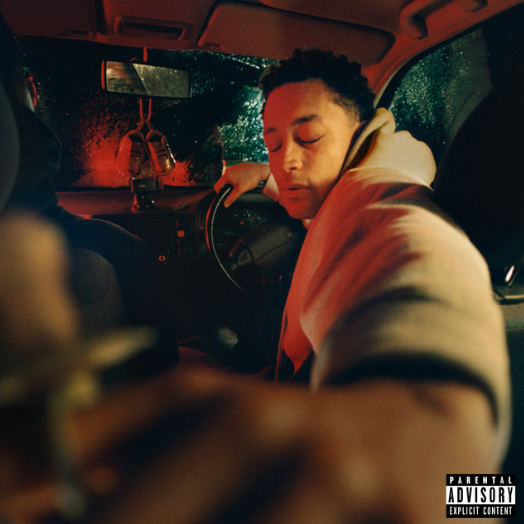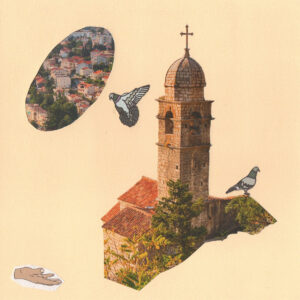In the past three years, non-drill hip-hop acts out of the UK such as Stormzy, Dave, and Little Simz have made a name for themselves on national and international stages. While the spotlight shone on these growing artists before and during the height of the Covid pandemic, Loyle Carner largely remained in the shadows. With two studio albums to his name, there was no rush for Loyle to ride the momentum of those records. Instead, he followed his 2019 project Not Waving, But Drowning by spending time with his newborn son and making amends with his father — both at the forefront of his conscience on his third studio album, hugo.
Despite the three year gap between Not Waving, But Drowning and hugo, there is an urgency with which Loyle approaches the subject matter on hugo. The trademark of Loyle Carner’s music has always been the mellow, laid back temperament he illustrates on the mic, leaving the listener with the reassurance that we are in no rush to get where we need to go. He accompanies this method of delivery with vivid imagery and poetic allusions that transport the listener to a more serene time. hugo calls upon this use of imagery, yet more weight resides in Loyle’s words than usual, his delivery assuming a more tense feel.
This did not surprise those who heard the three singles leading up to the release of hugo. The three singles — Hate, Nobody Knows (Ladas Road), and Georgetown — compose the first three tracks of the album. When absorbed in the context of the other tracks, the choice to release these three as singles before the full-length record makes sense. They are filled with some of the rawest emotion ever heard from Loyle, as he grapples with his biracial identity, his self-perception (rooted in a self-hatred), and the perception of those who surround him.
Hate operates as an introductory laundry list of all that he hates, loves, and fears about his blackness, offering an aggressive introduction over chaotic live drums. Nobody Knows (Ladas Road) — a track that sounds like a part two to Isle Of Arran (off of his first album, Yesterday’s Gone) — concludes by posing the question, “You can’t hate the roots of the tree, and not hate the tree… So how can I hate my father, without hating me?” This track sets the tone for the central theme of hugo, which rests on the shoulders of Loyle’s estranged father and how their tattered relationship has negatively affected Loyle’s conceptions of being a husband and a father. This leads into the introduction of Georgetown, which features an excerpt from poet John Agard’s Half-Caste that adds to Loyle’s refrain over a Madlib-produced beat: “Yeah I’m black like the key on the piano, white like the key on the piano.”
If the first three tracks represent Loyle getting these emotions off his chest, the remaining seven tracks strive to make sense of them. Blood on my Nikes situates Loyle at the scene of a boy murdered for his pair of shoes, as he questions why he was “scared of the night bus, scared of the boys that look like us.” Set over a spacious, introspection-inducing piano loop, A Lasting Place eloquently confronts the realization that characteristics of his father have seeped into him, the anger towards his father transitioning into an understanding of the conditions that may have shaped his father’s behavior.
While A Lasting Place could have sonically and conceptually concluded the album, Polyfilla and HGU form a necessary end to hugo, as Loyle expresses empathy and forgiveness to his father in the hopes that they can shatter the cyclical nature of absent/negligent fatherhood. The outro of HGU places the listener in the car with Loyle and his father as they make plans to play chess together later in the week — a touching ending that eases (even if just for a moment) the frustration and fear exuded in previous tracks.
It is hard not to consider hugo the moment to which Loyle’s career has been building up. It masterfully weaves the raw emotion and crisp drums of Yesterday’s Gone with the mellifluous piano backdrops of Not Waving, But Drowning, all while peeling back more layers from Loyle than have ever been revealed to his audience. The sensitivity and maturity with which Loyle approaches such heart-wrenching, scarring subject matter is nothing short of admirable and has constructed a timeless work of art in the process.
Favorite Tracks
*Nobody Knows (Ladas Road)
*Speed Of Plight
*Homerton (feat. JNR WILLIAMS and Olivia Dean)
*Blood on my Nikes (feat. Wesley Joseph and Athian Akec)
*A Lasting Place
What’s The Wave?
~This album begs you to sit still. Find a time in the night when you are not responsible to anyone or anything else, such that you will not be disrupted in the 34-minute run time. You could find a spot somewhere outside — perhaps a park bench or porch steps. Your room is also a viable option. If outside, a cloudy, foggy night would cater most effectively to the listening experience. The atmosphere should be dimly lit and isolated. There is no need to have a screen open as you listen, not will you need lyrics in front of you — you’ll be able to follow along without them.~


